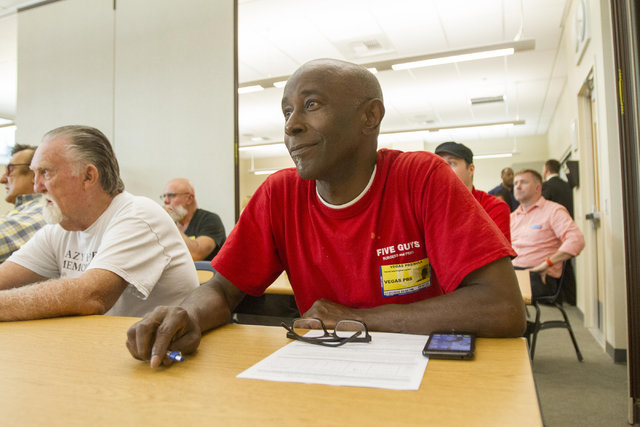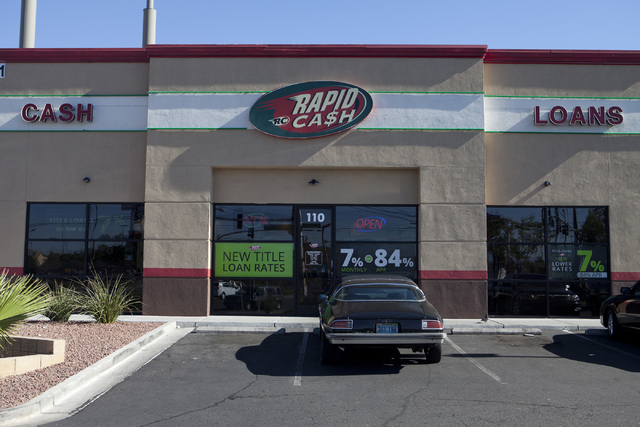Payday loans reform advocates say Las Vegas borrowers often end up on ‘treadmill of debt’
In a mile radius on Flamingo Road between Swenson Street and Koval Lane, there are four payday lenders. Cropping up like Starbucks or McDonald’s, there are many intersections around the Las Vegas Valley that have places for people to take out quick, short-term loans.
Moneytree, Dollar Loan Center, Rapid Cash, Check City, Star Loan Centers — there are plenty of options to choose from.
“There are more payday loans in Nevada than there are McDonald’s,” said AJ Buhay, the field director for Progressive Leadership Alliance of Nevada (PLAN), 2330 Paseo Del Prado. “All you really need is a pay stub, a photo ID and a few references. With that, people can have hundreds of dollars in about 20 minutes.”
The process of payday loans is simple — a lender lets people borrow a small amount of money to be paid back with interest in one lump sum by the next pay period. Some lenders allow people to make installment payments.
However, many activists advocating for payday lenders industry regulations see the darker side of the loans, saying they tend to be predatory.
Most people using payday loans make less than 30K
While a variety of people might take out a loan, most payday borrowers make less than $30,000 per year, according to PLAN.
“The people usually getting these loans are in a situation where they can’t take out a credit card or apply for another type of loan,” Buhay said.
According to the Consumer Financial Protection Bureau, each loan has a finance charge that ranges from $10 to $30 for every $100 borrowed. A standard payday loan equates to about 400 percent interest, while the annual percentage rate on a credit card is about 12 to 30 percent.
According to PLAN, the average payday loan taken out in Nevada is for $350, and Nevadans pay about $77 million annually in fees alone.
Along with fees and high interest rates, most payday loans also come with other problems, according to Buhay, who added, “they come with strings attached … (such as) access to your bank account.”
Despite the high risks, people taking out payday loans often do so because of emergencies.
“A lot of the borrowers don’t have financial literacy,” Buhay said.
Las Vegas resident Harold Carnes, 59, didn’t know how bad payday lenders could be when he swallowed his pride and walked into a Rapid Cash to get a loan to pay his rent.
Carnes has worked in fast-food service for nearly 20 years. Though he went to college in the ‘90s to study corrections administration, the job market didn’t turn out the way he had hoped it would.
In 2014, he and his wife moved to Las Vegas. Carnes was certain he could get a management job with Wendy’s, a company he’d worked for before. The day of the interview, he had to ride his bike in the 100-plus-degree heat to get to the store.
“I decided not to wear a suit because it was so hot,” he said.
He was refused an interview.
Instead, he landed an entry-level job at McDonald’s starting out at $8.25 an hour (he was making $9 by the time he left). Even working 100-hour pay cycles, he said it was rough managing bills on minimum wage. Making about $700 or $800 per paycheck after taxes, Carnes said the money would quickly be soaked up by his $269 weekly rent, leaving the rest for his remaining bills and food.
After he began volunteering for Fight for $15, a national campaign to increase the minimum wage, Carnes noticed his work hours were being slashed. Soon, he said he barely had enough to pay rent.
And it’s not just himself he has to think about — Carnes and his wife have custody of his 8-month-old grandson.
With his back against the wall, Carnes decided to take out a loan at Rapid Cash.
“It’s embarrassing to have to explain to them what you’re going through,” he said.
With $500 in hand, he paid his rent and hoped to quickly pay down the loan, which also included $143 of interest.
Some borrowers end up on ‘debt treadmill’
Sophia Medina and Tenille Pereira, staff attorneys with the Legal Aid Center of Southern Nevada, 725 E. Charleston Blvd., said most of their clients who have taken out payday loans have more than one.
“For most of our clients, payday loans are like potato chips,” Medina said. “They can’t just have one.”
When people get down on their luck and have to take out a loan, they might not be able to pay it back in the time allotted. They then take out another loan to cover the interest of the first loan, entering a brutal cycle.
“It creates a debt treadmill,” Pereira said.
Buhay added that it’s a toxic environment for borrowers.
“You are trying to catch up, but the only way to catch up is find another job where you’re making more money,” he said.
Carnes knows that cycle all too well. He thought he would be able to pay back his first loan through the repayment plan, but after his work hours were cut again on top of being out sick, he wasn’t able to pay. At first, he endured harassing phone calls trying to collect the money. Then, the lender suggested going to another payday loan center as an option.
Once again, Carnes took out another payday loan, this time at Moneytree. But with more of his hours being cut, he wasn’t able to pay off either loan and defaulted on both.
Before defaulting on a payday loan, borrowers have the option to renew the loan by paying the interest rate, but only for about 90 days. After that, they must produce the money or risk defaulting.
Defaulted loans usually end up in small claims court
Once they default and are sued, borrowers can have their wages garnished.
“A huge number of payday loans go to small claims court,” Medina said. “What we do is review the contract and try to see if all the statutes and regulations were followed.”
According to the Legal Aid Center’s 2015 Annual Report, 33 percent of its cases deal with consumer rights.
Medina said in the last 12 months, the nonprofit took on 75 payday and title loan cases.
“If we have the resources and the case has merit, we will take the case,” she added.
Pereira said before it takes on clients, it assesses the financial need of the person and whether he has a case. Many cases are accepted pro bono.
Most clients don’t know that payday lenders are supposed to offer a repayment plan prior to seeking legal action. Even if some payday loan debts can’t be sued because of lending contracts, Pereira said they have seen cases where the payday lender will sell the debt to a collection agency, which can sue for the money.
The Consumer Financial Protection Bureau is trying to propose rules to regulate the industry, which include giving borrowers more options when it comes to repaying and having a better screening process to make sure they are set up to repay the loan.
While regulations are being discussed on a national level, Buhay hopes local legislators take actions to reign in payday loan practices in Nevada.
The Payday Lender Best Practices Act under the Nevada Revised Statutes is Nevada’s attempt to offer some accountability by putting regulations on loan extensions and steps a lenders must follow before collecting a debt.
However, many advocates feel it’s not enough.
Buhay said one of the problems is Nevada doesn’t cap the interest rate on payday loans, which have been reported to be as high as 521 percent. Some states have banned payday lenders altogether, while others have capped the interest rate.
Buhay said another issue is that payday loans are siphoning money out of poor and minority communities.
Some businesses, such as marijuana dispensaries, have a set number of business licenses that can be issued. That isn’t the case for payday lenders.
In the meantime, people are still having to deal with the lack of regulations.
As of right now, Carnes has not been sued for his unpaid loans, which total nearly $2,000 with interest.
Though he is now working at Five Guys Burgers and Fries — a job he said he enjoys — he still makes only $8.50 an hour. With more consistency in his schedule, he said he and his wife are finally able to afford an apartment.
However, his payday loans are in default, and his paycheck doesn’t allow the flexibility to repay.
PLAN is also trying to get more people to share their stories about payday loans.
“People are often too embarrassed,” Buhay said. “They think it is their fault when they default on their loans and don’t realize the system is stacked against them in the first place.”
For more information on PLAN, visit planevada.org.
For more information on Legal Aid Center of Southern Nevada, visit lacsn.org or call 702-386-1070.
Editor’s note: This is the first story in a series about the payday loan industry in Las Vegas. If you have had an experience with payday loans, please contact View Assistant Editor Anne King at aking@viewnews.com.
To reach Henderson View reporter Michael Lyle, email mlyle@viewnews.com or call 702-387-5201. Find him on Twitter: @mjlyle.
Find out more
For more information on PLAN, visit planevada.org.
For more information on Legal Aid Center of Southern Nevada, visit lacsn.org or call 702-386-1070.


















